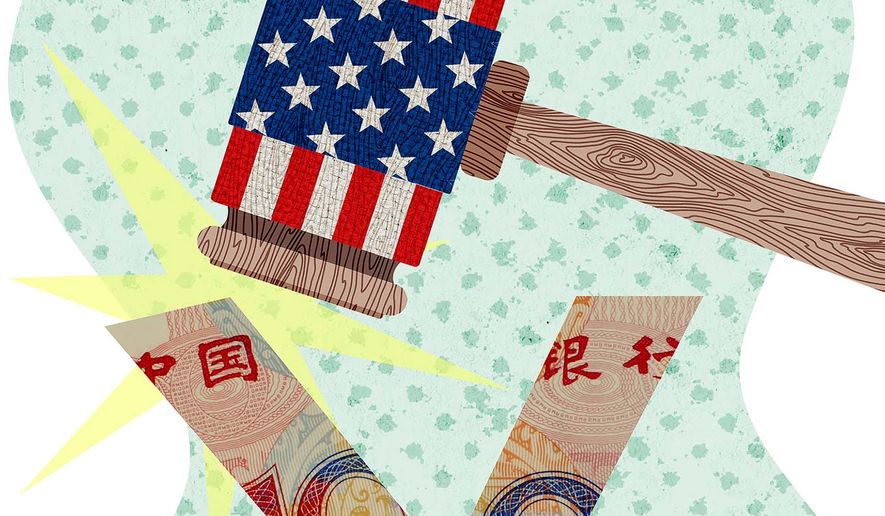OPINION:
A nation is powerful if its economy is too, if it has nuclear weapons with which it can fight, or both. Our economy made us a post-World War II superpower as much as our nuclear arsenal did.
China, like the U.S., is a superpower due to its economy and its nuclear arsenal. But if its economy fails to support its aggressive strategies, China’s strength and its hold over its people will diminish greatly.
There is considerable evidence that China’s economy is in a deepening slump. It is in our strategic interests to worsen those problems.
We have been in a cold war with China for three decades. China threatens us and our allies in the Pacific with military action, perpetrates thousands of cyberattacks against us every day and steals hundreds of billions of dollars in intellectual property from us each year. Its purchases of Iranian oil keep the world’s principal terrorist regime in power. North Korea is a Chinese client state for which China builds such things as missile launching trucks.
For decades after World War II, America’s economy was by far the world’s largest. China has been catching up steadily. In 2020, our Gross Domestic Product was about $21 trillion, and China’s was about $16 trillion. China had a record trade surplus in 2021, despite slower overall growth in the second half of the year. China’s economy is projected to equal or surpass ours by 2030, but several intervening factors may prevent that from happening.
Evergrande and Kaisa are two of the largest Chinese property development firms. Both defaulted on their debt payments in late 2020 and entered bankruptcy last month along with several other over-leveraged firms, according to a Wall Street Journal report. China’s central bank has had to bail out several big lenders. These effects aren’t as catastrophic as the failure of Lehman Brothers was in 2008 (which helped create that year’s U.S. financial crisis), but they are significant dents in China’s economy.
Last month, Chinese bankers reportedly bought more in low-risk financial instruments than they made in loans to meet their government-imposed lending quotas. This is contrary to Chinese President Xi Jinping’s desire for the banks to lend more and will limit China’s economic growth.
An even more significant event is the reported slowdown of China’s “Belt and Road Initiative.” The BRI, in which China has reportedly invested $4 trillion, has been lending 50 developing countries massive sums for construction projects to be built by Chinese companies. Those loans have the effect of turning those nations into tribute states that owe China more than they can pay. There are conflicting reports, but many of the BRI projects apparently have been excavated but not built. This probably indicates a reduction in the availability of Chinese capital.
A Wall Street Journal report stated, “China is experiencing a slow-motion economic crisis that could undermine stability in the current regime and have serious negative consequences for the global economy.” It also said that “an economic meltdown is a potential threat to the implicit social compact in China between authoritarian rulers and a quiescent population” and that the U.S. should not assume continued Chinese economic growth.
China’s Wuhan Institute of Virology is almost certainly the place from which, intentionally or not, the COVID-19 virus was released. China’s economy is still being hit by COVID-19 lockdowns of whole cities that are home to tens of millions.
China, then, is clearly not the economic superpower it would have us believe it is. It is a totalitarian state which is not immune to the market rules that govern capitalism or economic pressure we could bring to bear.
It is President Biden’s duty to take advantage of and increase China’s economic problems. But he won’t. He is soft on China, as demonstrated by his removing Trump-era restrictions on Chinese media operating in the U.S. and his promise to reverse U.S. policy that said the Chinese Communist Party was not the legitimate ruler of China (on March 3, 2020, the Washington Monthly reported some Chinese media organizations are agents of the country’s intelligence apparatus). Mr. Biden’s diplomatic boycott of the Chinese Olympics is a perfectly empty gesture.
Mr. Biden could and should do more. China’s imposition in 2020 of a new security law on Hong Kong ended the island city’s autonomy. That law provides, for example, that people accused of the crimes of “subversion” and “collusion with foreign forces” may be tried in mainland China where the administration of justice is government-controlled.
Mr. Biden should invoke the Hong Kong Autonomy Act and, under the Hong Kong Policy Act of 1992, end its special status. If he did, sensitive U.S. technologies could no longer be exported to Hong Kong, and its exports could be subjected to the same tariffs that are imposed on Chinese goods.
We can have an even greater effect by imposing sanctions on Chinese banks that do significant transactions with entities that materially contribute to the contravention of China’s obligations. Last year, the Senate considered such actions under a bipartisan bill and then dropped the ball.
Those actions wouldn’t cripple the Chinese economy, but they would certainly worsen China’s economic problems. This opportunity may not come again, but Mr. Biden won’t do any of those things. He is too weak and complacent toward China to do anything that might inconvenience it.
• Jed Babbin, a deputy undersecretary of Defense in the George H.W. Bush administration, is the author of “In the Words of Our Enemies.”




Please read our comment policy before commenting.